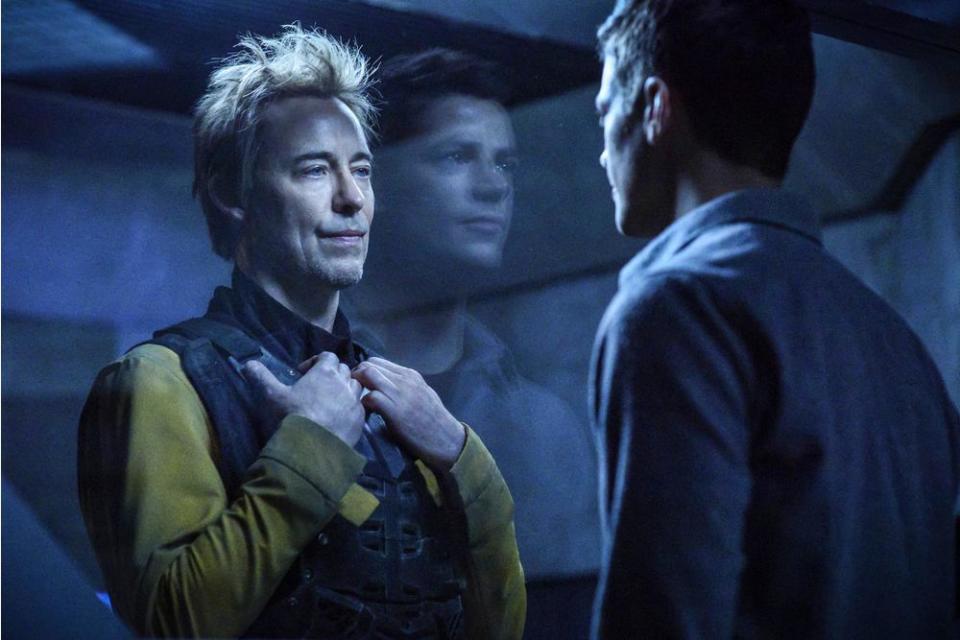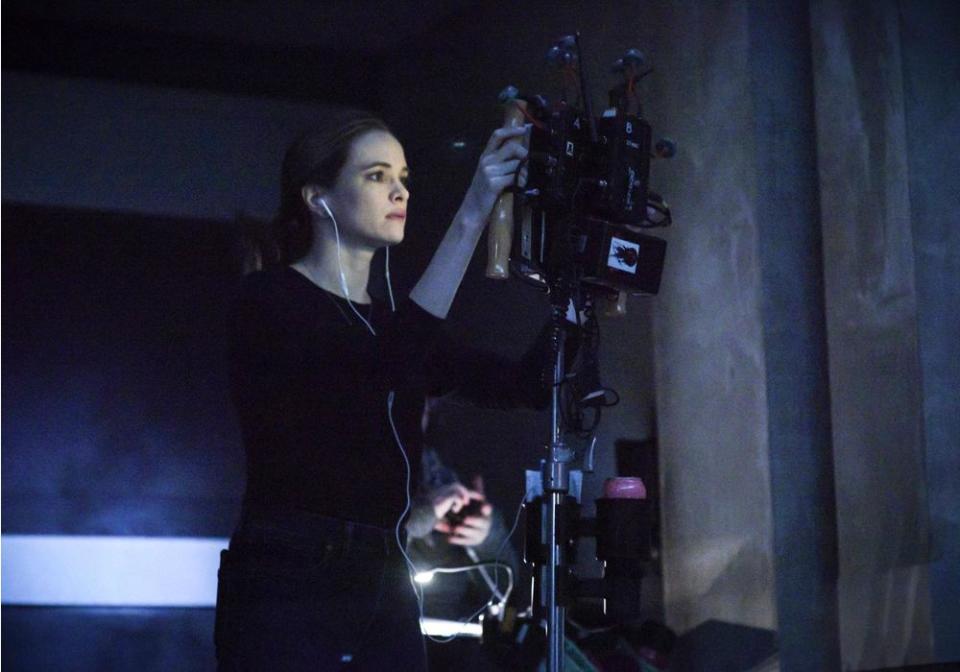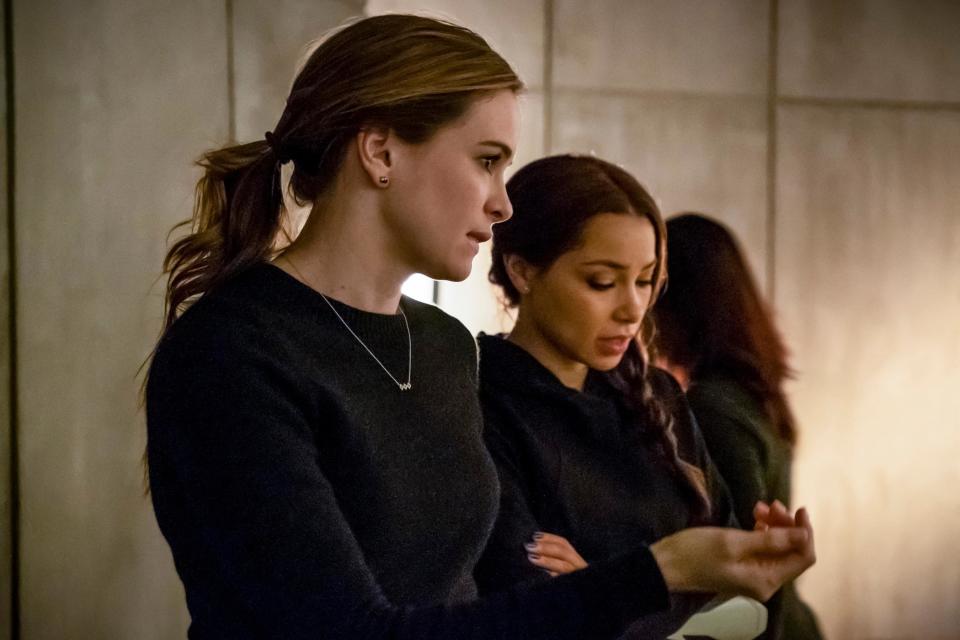The Flash : Danielle Panabaker on directing Nora's origin story, depicting a 'post-Crisis' future
The Flash is heading straight for the future for star Danielle Panabaker’s directorial debut.
Picking up in the wake of Team Flash discovering Nora’s secret, Tuesday’s episode, “Godspeed,” dives into Nora’s (Jessica Parker Kennedy) origin story and reveals how she ended up working with Eobard Thawne/Reverse Flash (Tom Cavanagh) and what a post-Crisis Central City actually looks like. Meanwhile in the present, Barry (Grant Gustin) and Iris (Candice Patton) are still reeling from their shocking discovery, which creates some tension between the two parents.
Ahead of the episode, EW hopped on the phone with Panabaker to discuss the challenges of directing “Godspeed,” the introduction of the titular evil speedster, and more.
ENTERTAINMENT WEEKLY: This is the first new episode after Team Flash found out Nora’s been working with Reverse Flash. What was it like directing such an important episode?
DANIELLE PANABAKER: It was an honor. I feel so grateful. It was an incredible script. I was very lucky just to get an important storyline for Team Flash, for Barry and Iris, to Nora. So I really wanted to do it justice, and I’m excited. I feel like it was a big episode as well. You know, to go back and tell Nora’s origin story is important, and I’m excited for fans to get to see it.
How did you approach directing the flashbacks/flash-forwards to Nora’s origin story?
For me, the challenge was taking the one week of prep that we had and doing everything we can to create this 2049 world and make it look as modern and futuristic as possible within the budget that we were given. I have to say, our production designer and locations department did an incredible job at finding places we can film that hopefully feel a little otherworldy. There’s these tiny cars that we got that I’m obsessed with. In terms of working with Jess, that was a gift because she’s so incredibly talented. That part was easy.
Arrow’s depiction of the year 2040 was pretty dark, and so far we’ve only seen the inside of Iron Heights whenever Nora speeds to the future. What does Central City look like in 2049?
2049 is a post-Crisis world. It actually looks really modern and sleek. One of the writers suggested that it looks very KonMari; everyone went through and got rid of everything that didn’t spark joy. So, a little bit minimalist, but clean and white and bright.
How are Barry and Iris handling this huge surprise?
It’s a struggle, for sure. For Barry to find out that his daughter has been working with the man who killed his mother in front of him when he was a child, it’s an incredible betrayal. I’m not sure that’s something that Iris completely comprehends, and they’re going to struggle a little bit as a couple and as a parents with how to cope and how to get through this.

Barry comes face to face with Thawne in this episode too. What was it like directing that moment?
I felt incredibly lucky. I was dreaming about that scene from the first time I read that script. Because Eobard Thawne is such a strong villain, he really gives Barry a run for his money. Eobard in particular is very smart and manipulative, and he is Barry’s archnemisis. To get to do that scene with those two unbelievable actors was such a gift.
Did you read any comics to prepare and inspire the episode?
Absolutely! The episode is called “Godpseed,” so I reached out to DC and got as many comic books on Godspeed as I could. I wanted to learn about him and try to pay homage to the comic book style of having a villainous speedster on the show.
What can we expect from Godspeed in this episode?
I think it’s pretty cool. It’s the first time we’ve seen a speedster villain in a while, and I think he’s the perfect enemy for Nora as her first villain.
How did you handle having to direct yourself in the episode?
That actually was a challenge, for sure. I only really had one day’s worth of work as an actor in the episode, [but] it was a challenge for a couple of different reasons. The first being that was actually my first day directing. One piece of advice a lot of directors gave me was “Make your first day easy.” Unfortunately, due to scheduling conflicts, that wasn’t a possibility, so my first day was a challenge because I had to act and direct. The writer Kelly Wheeler was up with me in Vancouver, and I entrusted her to keep watching playback. It’s also a big cortex scene, so we’re operating three cameras on every take, so there was no way for me to sit and watch the monitors. I didn’t want to waste time watching playback, so I had to trust what I was seeing while in the scene and also trust those behind the monitors that we were getting what we needed.
Whenever actors direct an episode of their show, they usually prepare by shadowing other directors. Which directors did you observe?
I shadowed a lot. I think I made our line producer a little crazy because I just kept showing up in production meetings. I just wanted to listen and observe as much as I could. In season 4, I formally shadowed Tom Cavanagh, which is a really unique experience, as well as David McWhirther when he directed our finale. As you know, the finale is one of the biggest episodes that we do in a Flash season, so I learned a lot from both of them. I also took the opportunity to grab drinks, grab coffee, or reach out to anyone who had directed on the show and ask for advice.

What was the most useful piece of advice you received?
Wear comfortable shoes. [Laughs] Actually, everyone gave me different advice. Tom gave me great advice on so many different things, but in particular on being an actor on the show, because the reality is, as soon as the episode is over, you go right back to standing next to everyone the way you were before you were a director. So you can’t burn any bridges. It was really, really useful advice. David McWhirther has unbelievable enthusiasm and energy. Everyone had different advice from their perspective.
When I spoke Danielle Nicolet last year, she said that Tom yells, “Lights! Camera! Action!” before every take like an old-timey director. Did you find yourself developing any directorial tics in the 10 days of production?
I’m sure I did, but I’m not necessarily sure I know what they are. It’s funny, Grant made a comment that there’s only a handful of directors who actually understood how to say “action!” before a scene, because it can really affect the energy and momentum of a scene. Whether he knew it or not, it was a compliment, but he did say I was among the ones who knew how to say “action!” well.
Have you caught the directing bug? Do you want to do more of it now?
As soon as everyone had seen my cut and I got some positive feedback, my next question was, “What can I direct next?”
Is there another Arrowverse show you’d like to direct? If so, which one?
Absolutely! I would love to go over to Supergirl. They’re a very positive and enthusiastic set. I feel like the tone is a little bit similar. One of the hard things that you have to balance on Flash is this classic concept of “heart, humor, and spectacle,” and I think Supergirl has a lot of that in a different way than Legends, which is a little wackier and leans into the humor of it more, or Arrow, which can be a little darker and a little more action-heavy.
The Flash airs Tuesdays at 8 p.m. on the CW.
Related content:


